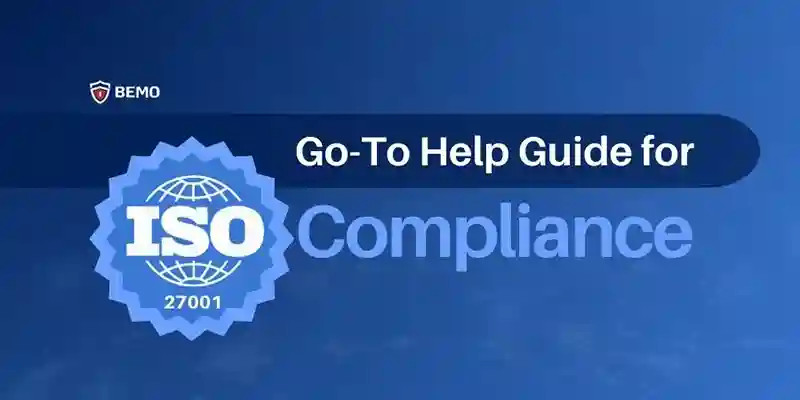
Many small business owners share the same frustration: losing deals to competitors who are certified as compliant. But instead of taking steps to balance the playing field, many small businesses stay stuck in the same cycle. We don’t want this to be you.
ISO 27001 offers a way out of this rut—not just as a compliance checkbox but as a game-changer for small businesses looking to grow, secure more deals, and build lasting trust with clients.
What is ISO 27001- and Is It Right for Small Business?
ISO 27001 is the international standard for managing information security. It’s designed to help businesses of all sizes protect sensitive information from data breaches, cyberattacks, and human error.
At its core is the Information Security Management System (ISMS), a structured system for identifying risks, setting security objectives, and ensuring those objectives are met. Think of it like locking all the doors and windows in your house while also installing an alarm system. You don’t just keep intruders out; you ensure your valuables are safe, even if you forget to lock the door one day. For small businesses, this translates to protecting client data, intellectual property, and other critical information.
ISO 27001 is applicable across industries, but it’s especially vital for small businesses handling sensitive or regulated data. Some specific examples include:
- Technology Companies: SaaS providers, cloud hosting platforms, and IT services companies both big and small rely on ISO 27001 to demonstrate their commitment to securing customer data.
- Healthcare Providers: Hospitals, clinics, and health-tech startups use ISO 27001 to protect patient information and meet compliance with regulations like HIPAA.
- Financial Services: Banks, fintech startups, and accounting firms benefit from ISO 27001 by building trust with customers and safeguarding financial transactions.
ISO 27001 isn’t just for large corporations; it’s increasingly becoming a must-have for small businesses and startups looking to scale while maintaining robust security practices.
How Does ISO 27001 Impact Sales and Revenue for Small Business?
1. Unlocking New Markets:
Some industries and regions won’t even consider partnering with a small business – or a company of any size -- that isn’t ISO 27001 certified. This certification can open doors to contracts that were previously out of reach.
2. Shortening Sales Cycles:
Imagine responding to a security questionnaire during a sales pitch with “We’re ISO 27001 certified.” It’s a statement that can eliminate hurdles and expedite decision-making, giving your small business a competitive edge.
3. Preventing Costly Breaches:
Beyond direct revenue benefits, ISO 27001 reduces the risk of data breaches, which could otherwise result in fines, reputational damage, and lost customers.
This is bad news no matter how big or small your business is, especially since cybercriminals have turned their focus to smaller and more vulnerable businesses.
4. Leveling the Playing Field:
Small businesses and startups can compete with larger enterprises by showcasing their commitment to top-tier security standards.
By implementing Compliance as a Service for small businesses and startups, you can streamline the process, enabling your team to focus on sales while experts handle the heavy lifting of certification.
How Long Does ISO 27001 Take for Small Business?
For a U.S.-based company with up to 1,000 employees, achieving ISO 27001 certification typically takes 6-12 months. The timeline depends on several factors, including the complexity of your small business operations, existing security measures, and whether you’re using tools like Compliance Automation to speed things up for your small business.
The fastest path to certification for small businesses often involves partnering with a provider who specializes in Managed Compliance for small business or startups. These types of companies can provide expert guidance, reduce delays, and help you achieve the fastest way to get compliant.
What Does ISO 27001 Cost for a Small Business?
Costs for ISO 27001 certification for startups and small businesses can range from $50,000 to $150,000 or more depending on your size and overall complexity. This includes:
- Consultation Fees: Professional guidance to assess gaps and design your ISMS.
- Internal Costs: Resources spent on documentation, employee training, and process adjustments.
- Certification Audit: Fees charged by an accredited certification body.
While the upfront costs may seem significant, the long-term benefits—particularly in terms of new business opportunities and risk reduction—far outweigh the investment.
Whether you’re aiming to secure contracts, expand into new markets, or simply build a reputation as a trustworthy partner, the ISO 27001 certification sets your small business apart.
If you're still exploring your options, we’re here to assist. Check out our ISO 27001 articles for in-depth insights into the framework, or visit our ISO 27001 page to discover how BEMO supports small businesses in achieving certification and unlocking new opportunities.
Top 10 Posts
-
Google Workspace to Office 365 Migration: A Step-by-Step Guide
-
Office 365 MFA Setup: Step-by-Step Instructions
-
How to Migrate from GoDaddy to Office 365
-
Migrate From Gmail to Office 365: 2024 Guide
-
CMMC Meaning : A Comprehensive Guide for Startups
-
How to remove Office 365 from GoDaddy (tips and tricks)
-
What is Microsoft Purview ? Your A to Z Guide to Getting Secure Fast
-
What is The CIA Triad?
-
How to Set Up Office Message Encryption (OME)
-
What are the 4 types of Microsoft Active Directory?


Leave us a comment!